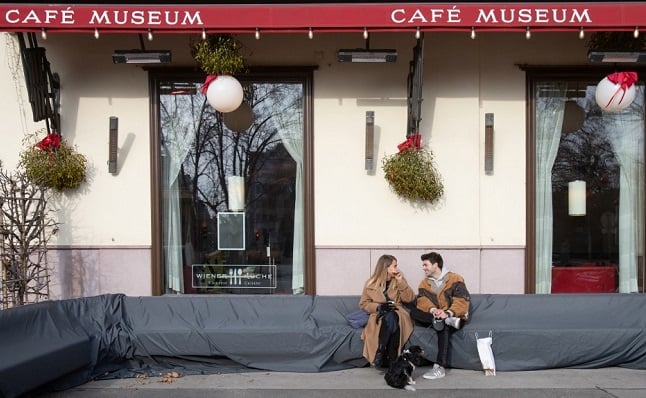Out of 88 valid responses to the survey, which was not scientific, 40 percent thought the government had handled the pandemic “very poorly” or “quite poorly”, while 28 percent thought they had handled it “very well” or “somewhat well”.
Many readers said that the response had unravelled over time, and that frequent changes in the rules had damaged trust and were hard to follow or understand the reasoning behind.
“The acute phase last year was handled well with clear measures and instructions. Financial compensation and testing availability were also handled extremely well. Lately however the government has been less clear, less decisive, more coercive and less transparent. This has lead to a certain amount of distrust among the unvaccinated and vaccinated alike,” said Kimberly, a Canadian living in the Salzburg region.
Zoltan, a Hungarian in his 40s working the creative industry, agreed: “Many decisions came too late and in an inconsistent ‘zig-zag’ way.”
George, a British retiree who had left his home in Salzburg for the UK during the pandemic, described the messaging around vaccines in Austria in particular as “chaotic”, highlighting early government statements which cast doubt on the safety of the AstraZeneca vaccine, prompting mistrust.
As well as inconsistencies over time, respondents also highlighted the differences caused by the regional approach to measures. Commonly mentioned was the success of Vienna’s at-home testing programme, while other regions have struggled to keep up with demand for tests and to process these in time.
READ ALSO: Which businesses are still open in lockdown?
Readers also spoke about political divides over Covid; highlighting the fact that Austria’s third-largest party in parliament openly campaigns against government restrictions and has shared misinformation on vaccines, as well as unclear messages from within the governing coalition itself.
“[The response is] not perfect but what else could one do to make it better given the situation? In Denmark for example the political parties agrees to keep Covid out of politics, but not here,” said a Sri Lankan reader in Vienna who asked to be kept anonymous.
“Perhaps the thing the government has failed to do most is to communicate effectively,” said Graham, a 50-year-old teacher in Salzburg. “There should be adverts at bus stops, shopping centres etc. encouraging people to wear masks. I guess a public education campaign might work, led by the [popular natural scientists and broadcaster] ‘David Attenborough’ of the country, whoever they are.”
Several respondents told us they were taking more restrictive measures than those required under Austria’s Covid regulations. For example, many fully vaccinated people reported taking PCR tests regularly, and many people said they were avoiding restaurants and busy areas, or wearing masks even in situations where it has not been legally required.
The Local carried out our survey after the announcement of an initial lockdown for unvaccinated residents but before this was extended to the full population, and received a lot of responses about the tactic of targeting measures specifically to unvaccinated people. This issue was one that prompted strong opinions, with 43 percent saying a partial lockdown was a “very good idea” and 40 percent saying it was a “very bad” one, and far fewer people choosing 2-4 on the five-point scale than when we asked about the government’s overall response.
Several unvaccinated people told The Local that the planned restrictions did not affect their lives that severely, saying they were happy to avoid shopping or restaurants for a short time.
But others called the lockdown a violation of “human rights” or “blackmail”.
One British student in Tyrol told us they was only complying because as a student at “a prestigious university in England” they did not want to risk getting into trouble there.
“As soon as I have graduated, I will no longer comply with whatever ludicrous restrictions. Why on earth, for example, should I be able to work my part time job in a department store, yet not be allowed to do my shopping at the exact same place? I will be attending demonstrations and riots too if those arise,” the student said.
A Burgenland resident from Mexico who also asked to remain anonymous said: “[The government] aren’t thinking thoroughly and are giving the vaccinated a sense of power over others and a sense of immunity. Now I’m even more sure I don’t want to get vaccinated.”
LONG READ: Why is German-speaking Europe lagging on Covid vaccines?
Some respondents expressed doubts over the efficacy of the vaccines or stated that the vaccines had not undergone sufficient trials (all the vaccines being used in Austria have undergone rigorous testing to meet safety standards, and are proven to be effective in reducing the risk of severe illness).
Other readers said they would prefer a greater emphasis on treatments for Covid than on increasing the vaccine rate. Several people who were unvaccinated mentioned the drug Ivermectin, an anti-parasitic medicine used to treat humans and animals that has been promoted by some (mainly in social media groups, but also by Austrian far-right leader Herbert Kickl) as a possible treatment for Covid, despite there being no evidence of its effectiveness in treating the virus and the EMA advising against its use. Incorrect use can be dangerous and one person in Upper Austria has required intensive care treatment after using it.
A tech worker in Linz from Malaysia said there was not enough focus on understanding why unvaccinated people had chosen not to have the jab, and that all residents of Austria had a responsibility to take part in this discussion: “We are entitled to our own opinions but not our own facts. We are not questioning or enquiring with our fellow friends, family members, colleagues, neighbours about why they have opted not to take it up. Too much is expected of the government in a democratic country that is suffering the brunt of misinformation even from within.”
Among both vaccinated and unvaccinated respondents, an often repeated concern was that differentiated measures could heighten social divides.
Several described the measures as appearing “punitive” rather than directly targeted at reducing infections, and pointed out that vaccinated people can also spread Covid-19.
READ ALSO: How Austria has reacted to the new nationwide lockdown
“The people like me, older, who are most at risk of severe COVID should shield. The rest of the population should not be under constant lockdown. It is ruining children’s and young people’s lives. People should take responsibility for their own health and take a vaccine if they agree to it. No government should place its citizens under the constraint of being vaccinated,” said a British retiree who is vaccinated.
“My opinion of Austria as a place to live has changed. Essentially I think it is a very desirable place of residence but the authorities have overstepped the mark and shown a side that shocks me,” said Albert, an education professional in Vienna who said he and his young son had got the vaccine in order to to be able to travel.
Some of our readers suggested alternatives to a partial lockdown (which is set to continue in Austria for the unvaccinated only, even after the general lockdown is lifted). These suggestions included wider mask mandates and requirements for testing for both vaccinated and unvaccinated people.
Wendy, who has lived for 26 years in the Tyrol region and is originally from the UK, said that while she was vaccinated, she thought the current measures “give the false impression that vaccinated are foolproof from either catching or transmitting the virus [and] shows desperate measures that the government cannot find the right messages to speak to the unvaccinated”.
She correctly predicted that the partial lockdown would lead to a full lockdown, and noted: “To put blame on one set of society [for a problem which is] based on poor governance and poor messaging to reach the unvaccinated, is simply a headless chicken running the country. They don’t know which way to turn – how can they, after all the recent corruption charges!”
Among those who supported the lockdown for the unvaccinated, a small proportion told us they wanted to see the government go even further and introduce vaccine mandates, a measure which the government has now announced will come into effect from February.
“In the end, after much demonstration, they will be respected for making the difficult but correct decision,” said a US retiree in central Vienna.
“Public safety is more important than personal freedom, just like speed limits, or not allowing children to buy cigarettes,” said a Lower Austria resident, originally for Finland.
One thing was clear from the range of responses to our survey: people in Austria are longing for life to return to normal.
“I think the virus is here to stay whether we like it or not, I don’t think I want to spend the rest of my life wearing a mask everywhere I go. I miss seeing people smile as they go about their days,” said Matthew, a bike courier in his 20s summing up the thoughts of many.
How we carried out this survey
This was not a scientific survey. The Local asked its readers to rate Austria’s government’s handling of the pandemic on a scale of 1 (very poor) to 5 (very good), and also asked them to rate the decision to impose lockdown on unvaccinated people on a scale of 1 to 5. The vast majority of responses were received before the decision to introduce a new general lockdown and vaccine mandate were announced.
We received 88 valid responses (after discarding 2 which contained slurs and hate speech). It was not mandatory for respondents to state their age, nationality or residence, but of those who gave this information, responses came from people aged between 20 and 77, living in each of Austria’s nine regions, originally from at least 20 different countries.



 Please whitelist us to continue reading.
Please whitelist us to continue reading.
Member comments